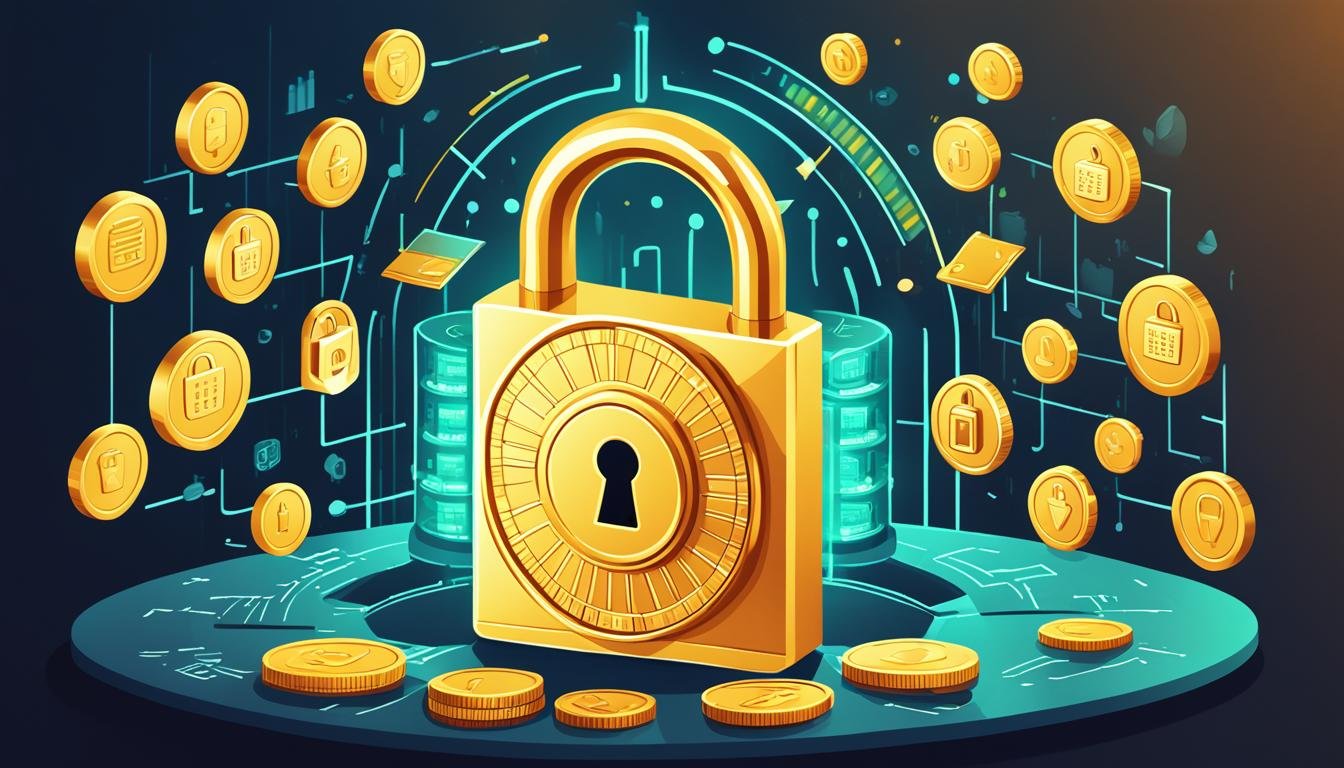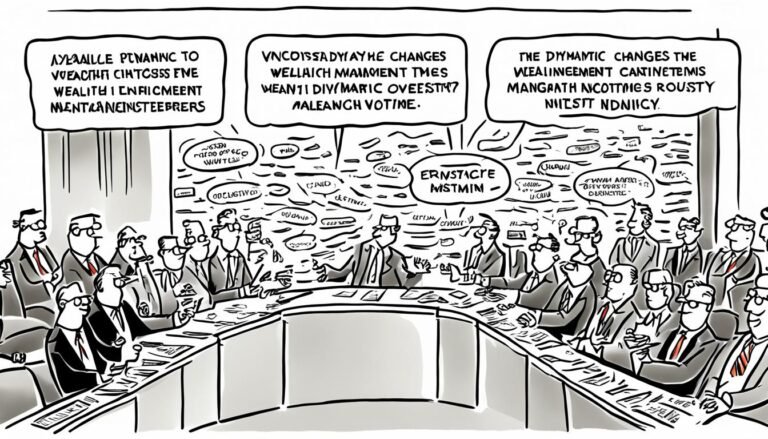Wealth Management and Cybersecurity Essentials
Did you know that cybercrime is projected to reach a staggering $10.5 trillion, surpassing the sale of illegal drugs? With the growing dependence on technology, wealth management firms face increasing cybersecurity risks that can jeopardize their clients’ financial assets.
As the importance of cybersecurity continues to rise, it is crucial for wealth managers to prioritize the implementation of robust cybersecurity practices to protect their clients’ wealth. By understanding and mitigating cyber risks, wealth managers can not only safeguard their clients’ assets but also gain a competitive advantage in the industry.
Key Takeaways:
- Cybercrime is projected to reach $10.5 trillion, surpassing the sale of illegal drugs.
- Wealth management firms face increasing cybersecurity risks.
- Prioritizing cybersecurity can protect clients’ financial assets and provide a competitive advantage.
The Growing Threat of Cybercrime
Cybercrime poses a rapidly growing threat in today’s digital landscape. With cybercriminals becoming more sophisticated in their tactics, the need for robust cybersecurity measures has never been more crucial. It is estimated that the global cybercrime industry will reach a staggering $10.5 trillion, surpassing the illegal drug trade in terms of revenue.1
Clients’ financial assets, access to credit and healthcare, and even personal safety are all at risk in this increasingly interconnected world. Cybercriminals can target individuals’ bank accounts, steal personal information for identity theft, and launch attacks that can disrupt critical infrastructure and systems.2
Despite these alarming risks, many wealth managers currently do not prioritize cybersecurity. However, this lack of attention is likely to have severe consequences in the near future. Cyberthreats are expected to double in the next three years, highlighting the urgent need for wealth managers to address these risks and protect their clients’ financial well-being.3 To mitigate the growing threat of cybercrime, wealth managers must take proactive measures to safeguard their clients’ assets and maintain their trust.
“The global cybercrime industry is projected to reach $10.5 trillion, surpassing the sale of illegal drugs.”
References:
- World Economic Forum – “The future of financial crime”
- Interpol – “Cybercrime: It’s not personal”
- Cybersecurity Ventures – “Cybercriminals to cost the world $10.5 trillion annually by 2025”
Why Wealth Managers Should Help Manage Cyber Risks
Wealth managers have a unique opportunity to assist their clients in mitigating cyber risks by leveraging their expertise in risk management. By incorporating cybersecurity services into their offerings, wealth managers can not only contribute to their clients’ financial security but also gain a competitive advantage in the industry.
Addressing cyber risks allows wealth managers to strengthen client relationships and differentiate themselves from their competitors. Clients entrust their wealth managers with sensitive financial information and expect them to provide a secure environment. By offering comprehensive cybersecurity solutions, wealth managers can demonstrate their commitment to protecting their clients’ assets, building trust, and establishing long-lasting partnerships.
Furthermore, the repercussions of a cyberattack or identity theft extend beyond the affected client. When a wealth manager’s client falls victim to such incidents, it becomes the wealth manager’s problem as well. The time and cost implications of resolving these issues can be significant, further highlighting the importance of proactively addressing cyber risks.
Incorporating cyber risk management into their services is relatively easy and cost-effective for wealth managers. They can leverage existing risk assessment frameworks and partner with cybersecurity experts to develop tailored solutions. By integrating cyber risk management practices into their operations, wealth managers can ensure that they are consistently equipped to identify and address potential vulnerabilities.
The Role of Wealth Managers in Cyber Risk Management
“Wealth managers are uniquely positioned to help their clients navigate the complex landscape of cyber risks and protect their financial assets.”
Wealth managers can play a pivotal role in educating their clients about the importance of cyber risk management and the steps they can take to safeguard their wealth. This includes providing guidance on secure online practices, educating clients about common cyber threats, and promoting the adoption of strong passwords and multi-factor authentication.
Additionally, wealth managers can collaborate with cybersecurity experts to conduct comprehensive risk assessments and implement effective risk management strategies. By identifying potential vulnerabilities and implementing robust cybersecurity measures, wealth managers can establish a secure environment for their clients’ financial information.
The Competitive Advantage of Addressing Cyber Risks
“By actively addressing cyber risks, wealth managers can differentiate themselves in a crowded market and attract clients seeking comprehensive financial security.”
In today’s digitally interconnected world, clients are increasingly concerned about the security of their financial assets. By offering robust cybersecurity services, wealth managers can position themselves as trusted advisors who understand and address these concerns. This can attract a new client base and contribute to client retention and loyalty.
Furthermore, clients often prioritize wealth managers who demonstrate a proactive approach to managing cyber risks. By integrating cybersecurity into their services, wealth managers can showcase their dedication to protecting their clients’ wealth, giving them a competitive edge over their peers who do not prioritize cybersecurity.
The Cyber Essentials for Wealth Management
Implementing cyber essentials is crucial for wealth management firms. The Cyber Essentials guide provides a framework for organizational cybersecurity practices. It emphasizes building a culture of cyber readiness and includes essential elements such as leadership involvement, cybersecurity awareness and vigilance, protecting critical assets and applications, ensuring secure surroundings, safeguarding data, and developing a crisis response strategy. Following these essentials can significantly enhance the resilience of wealth management firms against cyber threats.
Cybersecurity is a fundamental aspect of risk management for wealth management firms. By adopting the principles outlined in the Cyber Essentials guide, firms can establish a strong foundation of security measures to protect their clients’ financial assets. It provides a comprehensive approach to mitigating cyber risks and ensures that necessary precautions are taken to prevent unauthorized access, data breaches, and other cyber threats.
One of the key elements highlighted in the Cyber Essentials guide is the importance of leadership involvement. It is crucial for senior management to actively champion and support cybersecurity initiatives within the firm. By prioritizing cybersecurity, leaders can set the tone for the entire organization and promote a culture of cyber readiness.
Cybersecurity awareness and vigilance are also critical components of the Cyber Essentials framework. Wealth management firms should invest in training programs and educational resources to ensure that their employees are well-informed about the latest cyber threats and know how to identify and respond to potential risks. By fostering a cybersecurity-conscious workforce, firms can significantly reduce the likelihood of successful cyber attacks.
Protecting critical assets and applications is another vital aspect emphasized in the Cyber Essentials guide. Wealth management firms should implement robust access controls, regular vulnerability assessments, and strong encryption protocols to safeguard sensitive data and systems. This includes securing client information, financial records, and other confidential data from unauthorized access or manipulation.
In addition to protecting digital assets, ensuring secure surroundings is equally important. Physical security measures, such as secure access controls, video surveillance, and visitor management protocols, can reduce the risk of unauthorized physical access to sensitive areas and equipment. Wealth management firms should also consider implementing stringent policies for the disposal of confidential documents and electronic devices to prevent data breaches.
Safeguarding data is a critical responsibility for wealth management firms. The Cyber Essentials guide emphasizes the importance of implementing secure data storage and transmission practices. This includes storing data in encrypted formats, regularly backing up critical information, and using secure communication channels when transmitting sensitive data. By adopting these practices, firms can minimize the risk of data loss or theft.
Finally, developing a comprehensive crisis response strategy is essential for effective cybersecurity management. Wealth management firms should have protocols in place to detect and respond to cyber incidents promptly. This includes establishing incident response teams, conducting regular drills and exercises, and having clear communication channels to ensure a coordinated and efficient response in the event of a cyber attack.
By following the Cyber Essentials framework, wealth management firms can enhance their overall cybersecurity posture and better protect their clients’ financial assets. Prioritizing risk management and implementing these foundational cybersecurity practices can provide peace of mind to both clients and the firm, ensuring a secure and resilient environment for wealth management operations.
Social Engineering and Cybersecurity Risks for HNWIs
High-net-worth individuals (HNWIs) face unique cybersecurity risks, particularly when it comes to social engineering attacks. These attacks utilize social media platforms to gather personal information, enabling cybercriminals to create convincing scams that specifically target wealthy individuals. Information about their wealth, property ownership, and lifestyle choices, which is often publicly available, can be exploited to deceive HNWIs.
To mitigate the risk of falling victim to social engineering attacks, HNWIs should take proactive steps to protect their online presence and promote cybersecurity awareness within their families. Limiting the amount of personal and financial information shared on social media platforms can significantly reduce the chances of being targeted by cybercriminals. Moreover, educating family members about the importance of cybersecurity and empowering them to identify potential threats can enhance the overall security posture of HNWIs.
“Cybercriminals are adept at leveraging information available on social media to tailor their attacks specifically to high-net-worth individuals, increasing the likelihood of success. It is crucial for HNWIs to be vigilant and prioritize cybersecurity in order to safeguard their wealth and personal information.” – Cybersecurity Expert
Furthermore, HNWIs should be cautious when engaging with unsolicited communication, even if it appears to come from trusted sources or individuals. Cybercriminals may impersonate family members, colleagues, or financial institutions to gain the victim’s trust and extract sensitive information or initiate fraudulent transactions. Implementing two-factor authentication mechanisms, verifying the authenticity of emails and phone calls, and regularly updating privacy settings can help HNWIs defend against social engineering attacks.
By proactively taking these steps, HNWIs can reinforce their cybersecurity defenses and better protect their wealth, personal information, and digital assets from the ever-evolving threat of social engineering attacks.
Protective Measures for High-net-worth individuals (HNWIs):
- Limit the information shared on social media platforms
- Educate family members about cybersecurity risks and best practices
- Implement two-factor authentication for online accounts
- Verify the authenticity of emails and phone calls before sharing sensitive information
- Regularly update privacy settings on social media profiles
Lack of Centralization and the Role of Employees in Cybersecurity
Centralization plays a significant role in the cyber risks faced by wealth management firms. With multiple individuals involved in managing a client’s financial plan, there is an increased risk of hackers exploiting the lack of verification and approval processes.
In order to mitigate these risks, wealth managers should implement a “trust but verify” approach. This involves requiring employees to confirm all emails and phone calls before transferring money or disclosing sensitive information. By adding this extra layer of verification, wealth managers can significantly reduce the potential for fraudulent activity.
It is also crucial for wealth managers to have visibility and transparency regarding where client assets are held. Without a centralized system, it becomes difficult to track and monitor the movement of assets, leaving them vulnerable to cyber attacks.
Employee training is an essential component of cybersecurity measures. By providing employees with the necessary knowledge and skills to identify and respond to potential threats, wealth management firms can strengthen their overall security posture. Training should cover topics such as recognizing phishing emails, implementing strong passwords, and identifying suspicious network activity.
The Importance of Centralization in Cybersecurity
A centralized approach to cybersecurity allows for better control and oversight of security measures. When all cybersecurity processes and policies are centralized, it becomes easier to monitor systems, detect potential vulnerabilities, and respond quickly to threats.
“Implementing a centralized cybersecurity framework ensures that all employees are following consistent security protocols. This not only reduces the risk of human error but also enables wealth managers to quickly address any potential security incidents.”
In addition, centralization enables wealth managers to implement robust access controls and authentication mechanisms. With a centralized system, administrators can easily manage user access, revoke privileges when necessary, and ensure that only authorized individuals have access to sensitive information.
The Role of Employee Training in Cybersecurity
Employee training is a crucial component of a comprehensive cybersecurity strategy. It equips employees with the knowledge and skills needed to identify and respond to potential threats effectively. By investing in ongoing training programs, wealth management firms can create a culture of security awareness and empower their employees to be the first line of defense against cyber attacks.
Training should cover a range of topics, including:
- Recognizing common phishing techniques and suspicious emails
- Creating strong and unique passwords
- Identifying and reporting potential security incidents
- Safely handling sensitive client information
- Understanding the importance of keeping software and systems up to date
Additionally, regular training sessions and simulated phishing exercises can help reinforce cybersecurity best practices and keep employees vigilant.
Comparison of Centralized and Decentralized Cybersecurity
| Aspect | Centralized Cybersecurity | Decentralized Cybersecurity |
|---|---|---|
| Control and Oversight | Enhanced control and oversight of security measures | Limited control and inconsistent oversight |
| Response Time | Quick response to potential threats | Delayed response due to fragmented systems |
| Access Control | Robust access controls and authentication mechanisms | Challenges in managing user access and privileges |
| Consistency | Consistent implementation of security protocols | Inconsistent security practices across the organization |
By centralizing cybersecurity processes and investing in employee training, wealth management firms can significantly enhance their ability to protect client assets from cyber threats. Centralization provides better control and oversight of security measures, while employee training ensures that all individuals within the organization are equipped with the knowledge and skills to identify and respond to potential threats.
Ransomware and Preventative Measures
Ransomware has become a significant threat to high-net-worth individuals (HNWIs) and family offices. Cybercriminals strategically target those who possess the means to pay the ransom, rather than dealing with the inconvenience of a locked computer. Protecting personal and financial information is paramount in preventing ransomware attacks.
To safeguard against ransomware, it is crucial to follow basic security practices. Creating strong and unique passwords for all accounts, enabling two-factor authentication, and regularly updating software are essential preventive measures. Additionally, educating employees and individuals with access to sensitive information about cybersecurity best practices can mitigate the risk of ransomware.
One of the most effective strategies in preventing ransomware attacks is maintaining regular backups of critical data. By regularly backing up important files and verifying their integrity, individuals and organizations can quickly recover from a ransomware incident without paying the ransom.
In the evolving landscape of cyber threats, prevention is undoubtedly the most effective approach. Implementing robust cybersecurity measures and educating stakeholders about the risks associated with ransomware are critical steps in safeguarding HNWIs and their invaluable assets.
Avoiding public Wi-Fi networks is another vital precautionary measure. Public Wi-Fi networks, particularly in luxury locations such as hotels and airport lounges, are notorious for being unsecured. Hackers can easily intercept sensitive information transmitted over these networks. When accessing the internet in such locations, it is advisable to use a virtual private network (VPN) to provide an additional layer of security.
Prevention, vigilance, and proactive measures are essential when it comes to combating the increasing threat of ransomware. By implementing preventative measures, individuals and organizations can fortify their defenses against this pervasive cyber threat.
The Importance of Preventative Measures Against Ransomware
Preventative measures play a crucial role in mitigating the risk of falling victim to ransomware attacks. Taking steps to protect personal and financial information, following basic security practices, educating employees, and avoiding public Wi-Fi networks are all fundamental strategies to prevent ransomware incidents.
Key Takeaways:
- Regularly back up critical data to ensure data recovery without paying a ransom.
- Follow basic security practices such as strong passwords and two-factor authentication.
- Educate employees and individuals with access to sensitive information about cybersecurity best practices.
- Avoid using public Wi-Fi networks in luxury locations and consider using a VPN for enhanced security.
By implementing these preventative measures, individuals and organizations can significantly reduce the risk of falling victim to ransomware and protect their valuable assets.
Luxury Locations and Wireless Spoofing
High-net-worth individuals (HNWIs) often find themselves targeted by wireless spoofing attacks, especially when utilizing public Wi-Fi networks in luxurious settings such as hotels and airport lounges. These networks in high-end locations may appear convenient, but they often lack the necessary security measures, making it incredibly easy for hackers to intercept sensitive information.
It is crucial for HNWIs to exercise caution when using public Wi-Fi and avoid logging into password-protected websites that contain critical data. The risk of malicious actors gaining unauthorized access to personal and financial information is significantly higher when connected to unsecured networks.
To counter these threats, using a virtual private network (VPN) is strongly recommended. A VPN acts as an extra layer of security by encrypting internet traffic, making it more difficult for hackers to access sensitive data. By connecting to a VPN, HNWIs can safeguard their online activities and protect their valuable information from potential interception.
Conclusion
Wealth management firms have a growing responsibility to integrate cybersecurity measures to protect clients’ financial assets. In an era of increasing cyber threats, prioritizing cybersecurity is imperative for wealth managers. By implementing cyber essentials, addressing social engineering risks, centralizing cybersecurity processes, preventing ransomware, and maintaining vigilance in luxury locations, wealth managers can play a vital role in safeguarding their clients’ wealth and ensuring long-term stability.
Integrating cybersecurity into wealth management practices is crucial to protect against the prevalence and sophistication of cyber threats. By following cyber essentials, firms can build a strong foundation for cybersecurity, including leadership involvement, awareness training, data protection, and crisis response strategies.
Furthermore, addressing the risks associated with social engineering is essential. Wealth managers should educate clients and family members about the importance of safeguarding personal information and adjusting privacy settings on social media platforms. This awareness can significantly reduce the risk of falling victim to targeted attacks.
Centralizing cybersecurity processes and implementing verification protocols can minimize vulnerabilities resulting from internal operations. By requiring employees to confirm all transfers of funds and maintaining transparency regarding client assets, wealth managers can strengthen their defense against cyber threats.








